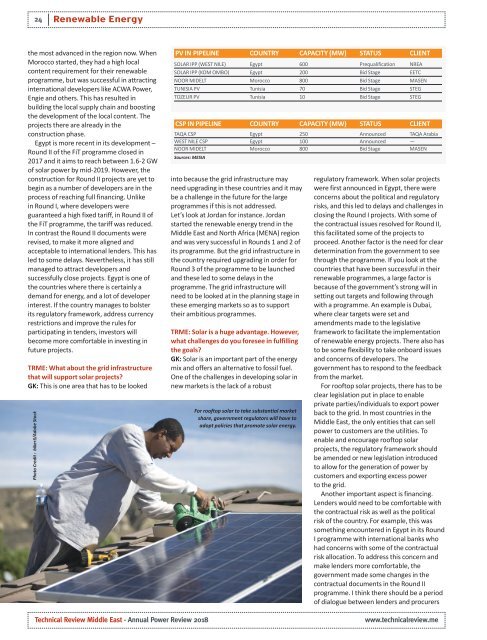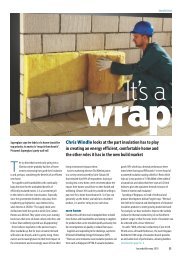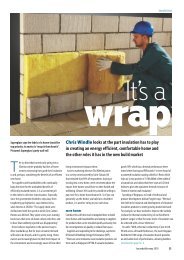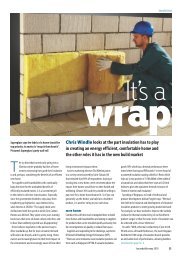TRME_4_2018
Technical Review Middle East
Technical Review Middle East
Create successful ePaper yourself
Turn your PDF publications into a flip-book with our unique Google optimized e-Paper software.
24 Renewable Energy<br />
the most advanced in the region now. When<br />
Morocco started, they had a high local<br />
content requirement for their renewable<br />
programme, but was successful in attracting<br />
international developers like ACWA Power,<br />
Engie and others. This has resulted in<br />
building the local supply chain and boosting<br />
the development of the local content. The<br />
projects there are already in the<br />
construction phase.<br />
Egypt is more recent in its development –<br />
Round II of the FiT programme closed in<br />
2017 and it aims to reach between 1.6-2 GW<br />
of solar power by mid-2019. However, the<br />
construction for Round II projects are yet to<br />
begin as a number of developers are in the<br />
process of reaching full financing. Unlike<br />
in Round I, where developers were<br />
guaranteed a high fixed tariff, in Round II of<br />
the FiT programme, the tariff was reduced.<br />
In contrast the Round II documents were<br />
revised, to make it more aligned and<br />
acceptable to international lenders. This has<br />
led to some delays. Nevertheless, it has still<br />
managed to attract developers and<br />
successfully close projects. Egypt is one of<br />
the countries where there is certainly a<br />
demand for energy, and a lot of developer<br />
interest. If the country manages to bolster<br />
its regulatory framework, address currency<br />
restrictions and improve the rules for<br />
participating in tenders, investors will<br />
become more comfortable in investing in<br />
future projects.<br />
trMe: What about the grid infrastructure<br />
that will support solar projects?<br />
gK: This is one area that has to be looked<br />
Photo Credit : biker3/Adobe Stock<br />
PV iN PiPeLiNe COUNtrY CaPaCitY (MW) statUs CLieNt<br />
SOLAR IPP (WEST NILE) Egypt 600 Prequalification NREA<br />
SOLAR IPP (KOM OMBO) Egypt 200 Bid Stage EETC<br />
NOOR MIDELT Morocco 800 Bid Stage MASEN<br />
TUNISIA PV Tunisia 70 Bid Stage STEG<br />
TOZEUR PV Tunisia 10 Bid Stage STEG<br />
CsP iN PiPeLiNe COUNtrY CaPaCitY (MW) statUs CLieNt<br />
TAQA CSP Egypt 250 Announced TAQA Arabia<br />
WEST NILE CSP Egypt 100 Announced —<br />
NOOR MIDELT Morocco 800 Bid Stage MASEN<br />
Sources: MESIA<br />
into because the grid infrastructure may<br />
need upgrading in these countries and it may<br />
be a challenge in the future for the large<br />
programmes if this is not addressed.<br />
Let’s look at Jordan for instance. Jordan<br />
started the renewable energy trend in the<br />
Middle East and North Africa (MENA) region<br />
and was very successful in Rounds 1 and 2 of<br />
its programme. But the grid infrastructure in<br />
the country required upgrading in order for<br />
Round 3 of the programme to be launched<br />
and these led to some delays in the<br />
programme. The grid infrastructure will<br />
need to be looked at in the planning stage in<br />
these emerging markets so as to support<br />
their ambitious programmes.<br />
trMe: solar is a huge advantage. however,<br />
what challenges do you foresee in fulfilling<br />
the goals?<br />
gK: Solar is an important part of the energy<br />
mix and offers an alternative to fossil fuel.<br />
One of the challenges in developing solar in<br />
new markets is the lack of a robust<br />
For rooftop solar to take substantial market<br />
share, government regulators will have to<br />
adopt policies that promote solar energy.<br />
regulatory framework. When solar projects<br />
were first announced in Egypt, there were<br />
concerns about the political and regulatory<br />
risks, and this led to delays and challenges in<br />
closing the Round I projects. With some of<br />
the contractual issues resolved for Round II,<br />
this facilitated some of the projects to<br />
proceed. Another factor is the need for clear<br />
determination from the government to see<br />
through the programme. If you look at the<br />
countries that have been successful in their<br />
renewable programmes, a large factor is<br />
because of the government’s strong will in<br />
setting out targets and following through<br />
with a programme. An example is Dubai,<br />
where clear targets were set and<br />
amendments made to the legislative<br />
framework to facilitate the implementation<br />
of renewable energy projects. There also has<br />
to be some flexibility to take onboard issues<br />
and concerns of developers. The<br />
government has to respond to the feedback<br />
from the market.<br />
For rooftop solar projects, there has to be<br />
clear legislation put in place to enable<br />
private parties/individuals to export power<br />
back to the grid. In most countries in the<br />
Middle East, the only entities that can sell<br />
power to customers are the utilities. To<br />
enable and encourage rooftop solar<br />
projects, the regulatory framework should<br />
be amended or new legislation introduced<br />
to allow for the generation of power by<br />
customers and exporting excess power<br />
to the grid.<br />
Another important aspect is financing.<br />
Lenders would need to be comfortable with<br />
the contractual risk as well as the political<br />
risk of the country. For example, this was<br />
something encountered in Egypt in its Round<br />
I programme with international banks who<br />
had concerns with some of the contractual<br />
risk allocation. To address this concern and<br />
make lenders more comfortable, the<br />
government made some changes in the<br />
contractual documents in the Round II<br />
programme. I think there should be a period<br />
of dialogue between lenders and procurers<br />
Technical Review Middle East - Annual Power Review <strong>2018</strong><br />
www.technicalreview.me







